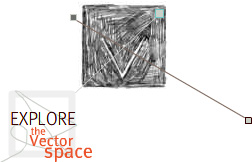The Virtual Window Interactive
Design by Erik Loyer
Editor's Introduction
"As we spend more of our time staring into the frames of movies, television, computers, hand-held displays -- "windows" full of moving images, text, icons, and 3D graphics -- how the world is framed may be as important as what is contained within that frame."
This opening declaration in Anne Friedberg's new book The Virtual Window: From Alberti to Microsoft, offers a glimpse of what is at stake in her expansive survey of visual culture over the past 500 years. The Virtual Window, published by MIT Press just weeks before the launch of the Vectors "Perception" issue, offers the opportunity to think deeply about the entangled forces that contribute to the evolution of technologies of vision -- everything from the etymology of key terms in visual culture to the science of glass manufacturing. Along the way, Friedberg seeks to theorize and historicize vision itself through a variety of critical "lenses," each of which operates in conjunction with certain technologies at specific moments in time. At first glance, Friedberg's elegantly crafted written work might not seem like an obvious source for digital reinterpretation. Indeed, it is a rare historian who is willing to subject such exacting scholarship to an interactive format that allows (and even encourages) playfulness, anachronism and surprise.
But the Virtual Window Interactive should not be regarded as a mere translation of the book. Through her collaboration with Erik Loyer, Friedberg uses the interactive format to construct a literal enactment of her critical paradigm of the "split optic," a form of parallel vision that considers both past and present simultaneously. Through juxtaposition of apertures, contents and avatar-viewers, The Virtual Window Interactive invites us to think critically about the past in light of present sensibilities, while using the past as a vehicle for thinking critically about the present. A genuinely eclectic range of primary source material places Stephen Colbert's "Green Screen Challenge" on a continuum that includes both Hitchcock and Rembrandt; and there is nothing to prevent a user from viewing a cinemascope film within the aperture of a video iPod, or watching excerpts from I Love Lucy in the frame of a Renaissance era stained glass window.
It is in the nature of interactive projects that you can never really be sure that you have read every word and seen every image. This is especially true of The Virtual Window Interactive, which requires patience and experimentation in order to experience it fully. Certain elements of Friedberg's text only become available in conjunction with particular combinations of aperture and content, for example, so an assiduous user might discover new elements upon repeated excursions into the project. In addition, many of the media examples in the interactive version are not addressed in the published text, and the project's database structure allows for the possibility of future addition, updating and revision. This mutability and expansiveness is arguably one of the most powerful aspects of digital publishing, and Vectors is fortunate that Friedberg was willing to risk having her scholarship subjected to potentially playful as well as serious interrogation. What Friedberg and Loyer achieve with the Virtual Window interactive is a mode of scholarly practice that is experiential, remixable and fluid, perhaps ultimately in ways that exceed the intentions of its creators.



